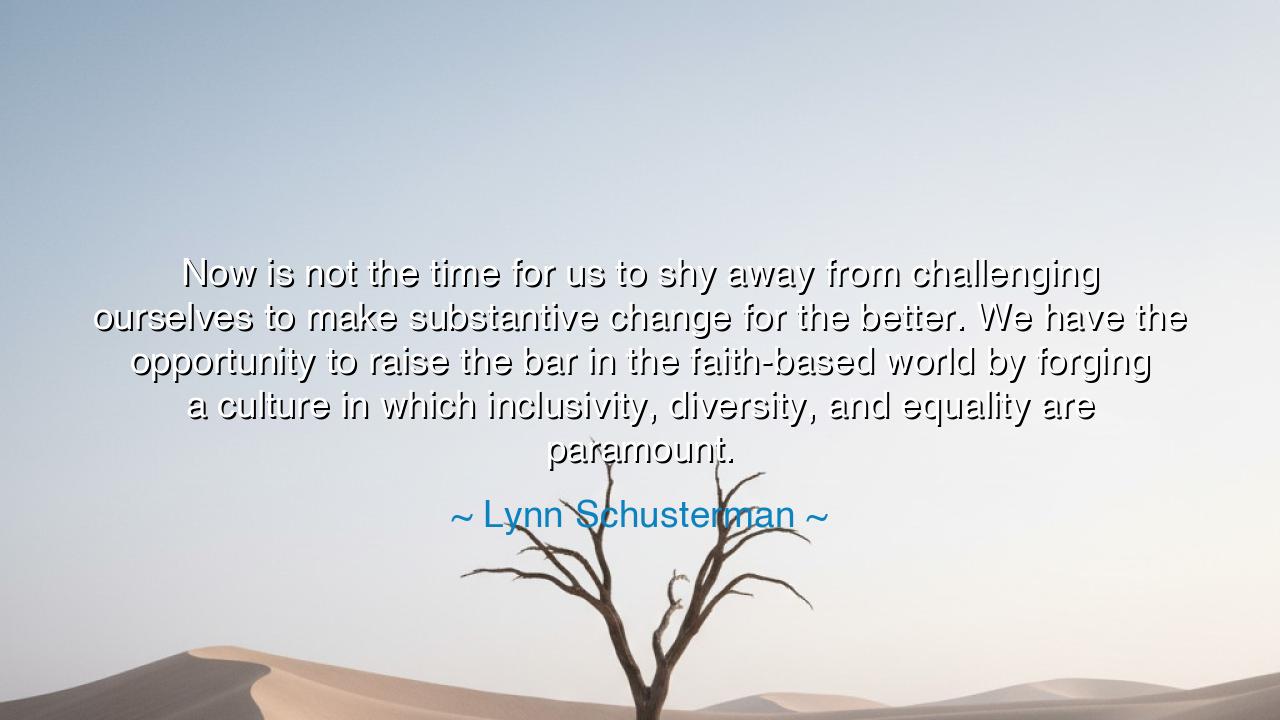
Now is not the time for us to shy away from challenging ourselves
Now is not the time for us to shy away from challenging ourselves to make substantive change for the better. We have the opportunity to raise the bar in the faith-based world by forging a culture in which inclusivity, diversity, and equality are paramount.






Hear now, O seekers of truth and builders of community, the words of Lynn Schusterman, a woman of vision and compassion, who declared: “Now is not the time for us to shy away from challenging ourselves to make substantive change for the better. We have the opportunity to raise the bar in the faith-based world by forging a culture in which inclusivity, diversity, and equality are paramount.” These words ring like a call from the mountaintop — a summons to courage, conscience, and collective renewal. For she speaks not of small reform, but of transformation — a reshaping of the spiritual and moral order to reflect the divine truth that all souls are equal beneath heaven’s gaze.
The meaning of her words is clear and profound. Schusterman challenges her listeners — people of faith, leaders of communities, and dreamers of justice — to confront complacency. She warns against the temptation to rest within the comfort of tradition when the world cries out for change. “Now is not the time to shy away,” she says, for there are moments in history when silence becomes a kind of betrayal, and inaction a wound to the spirit. To pursue substantive change is to move beyond words and symbols into deeds — to transform institutions, attitudes, and hearts. The faith-based world, she reminds us, should not be a sanctuary for exclusion, but a fountain of compassion, justice, and belonging.
The origin of this thought lies deep in Schusterman’s life and legacy. A philanthropist devoted to education, culture, and Jewish renewal, she has long sought to harmonize faith with progress — to unite the eternal truths of belief with the evolving needs of humankind. She speaks to an age where religion, once a shelter of the spirit, too often becomes a fortress of division. Yet her vision is ancient and holy: that the true purpose of faith is not to separate the righteous from the rest, but to bind all creation in the thread of divine love. In her heart, inclusivity is not modern invention but sacred remembrance — the rediscovery of a truth spoken by prophets long ago: that the Creator shows no partiality, for every human being is made in the image of God.
Throughout history, the greatest spiritual renewals have come when brave souls dared to “raise the bar.” Consider Saint Francis of Assisi, who, in an age of wealth and power, stripped himself of privilege to serve the poor, reminding the Church that holiness is found in humility. Or Rabbi Abraham Joshua Heschel, who marched beside Martin Luther King Jr., believing that to pray with one’s feet was as sacred as to pray with one’s lips. In each of these lives, faith became not a boundary but a bridge — a living force for diversity, inclusivity, and equality. Their courage, like Schusterman’s words, reminds us that when religion forgets compassion, it forgets its own soul.
To call for inclusivity is to call for the courage to see the divine spark in those who differ from us — in their color, their gender, their path of belief, or their way of love. To call for diversity is to honor creation itself, for the universe was not made in one hue or form, but in countless variations that together proclaim the majesty of life. And to call for equality is to echo the oldest moral truth: that no human stands above another, for the breath that animates one animates all. These three — inclusivity, diversity, and equality — are not political slogans, but sacred commandments for a world seeking its moral compass once again.
Yet Schusterman’s words do not rest in lofty ideals alone. They demand action. To “raise the bar” means to question, to confront, and to rebuild — to challenge prejudice within our own circles and to invite voices long silenced into the conversation. It means turning faith from ritual into relationship, from belief into service. Such work is not easy; it requires humility, listening, and the courage to admit that even the most sacred traditions must sometimes evolve to remain true. But this, she teaches, is not betrayal — it is renewal, the living pulse of faith as it grows with humanity.
Therefore, O children of light, take this lesson into your hearts: do not shy away from the call to transform what must be changed. Let your temples, churches, synagogues, and mosques become sanctuaries not only of prayer but of justice. Let every gathering of faith reflect the full beauty of the human family. For to exclude is to diminish the Creator’s image, but to include is to honor it. If faith is to remain alive in the modern world, it must open its arms wider than ever before — until every soul finds a home beneath its wings.
And so, let the words of Lynn Schusterman resound like a sacred charge: “Now is not the time to shy away.” The time is now, and the work is holy. Each act of kindness, each stand for justice, each embrace of difference is a prayer — a living testimony that faith and love are one. Raise the bar, then, not for pride, but for purpose. For only when inclusivity, diversity, and equality become the pillars of our spiritual life shall we draw closer to the divine vision — a world healed, united, and radiant with the light of compassion.






AAdministratorAdministrator
Welcome, honored guests. Please leave a comment, we will respond soon